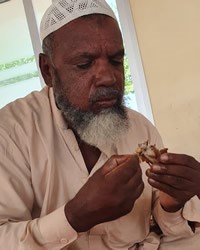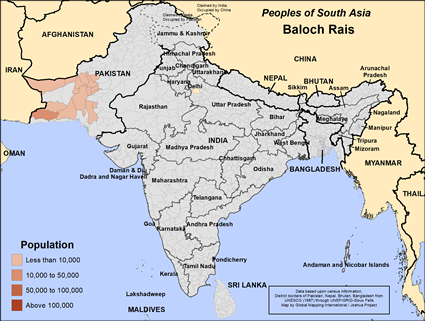Baloch Rais in Pakistan

Photo Source:
Adam Dessert Harvesting Minister
|

Map Source:
People Group data: Omid. Map geography: UNESCO / GMI. Map Design: Joshua Project
|
| People Name: | Baloch Rais |
| Country: | Pakistan |
| 10/40 Window: | Yes |
| Population: | 108,000 |
| World Population: | 108,000 |
| Primary Language: | Balochi, Southern |
| Primary Religion: | Islam |
| Christian Adherents: | 0.00 % |
| Evangelicals: | 0.00 % |
| Scripture: | New Testament |
| Ministry Resources: | Yes |
| Jesus Film: | Yes |
| Audio Recordings: | Yes |
| People Cluster: | Baloch |
| Affinity Bloc: | South Asian Peoples |
| Progress Level: |
|
Introduction / History
The name "Baloch" is derived from the name of the Babylonian king and god Belus. Some believe the word is a derivation of Sanskrit words "Bal" meaning strength and "Och" meaning high or magnificent.
The Baloch claim their origins to be in Aleppo in what is now Syria. They are descendants of Hazrat Ameer Hamza, the uncle of Islamic prophet Muhammad. Based on an analysis of the linguistic connections of the Balochi language, the original homeland of the Balochi tribes was likely the east or southeast area of the central Caspian region.
The Baloch generally live in remote mountainous and desert regions, which provides protection from invasions. They live mainly in the Balochistan region of the southeastern-most edge of the Iranian plateau in Pakistan, Iran and Afghanistan as well as in the Arabian Peninsula. They are subdivided among over 130 tribes. One of these Baloch tribes is the Rais, who speak the Southern Balochi dialect.
What Are Their Lives Like?
The Rais Baloch live according to tribal customs. Their men wear long shirts with long sleeves and loose pants. They sometimes wear turbans. The Baloch living in Iran observe a more conservative dress code; some women cover their faces with thick red wools and wear a head scarf and long veil. Gold ornaments such as necklaces and bracelets are an important aspect of Rais Baloch women's traditions. They usually wear a gold brooch that is used to fasten two parts of the dress together over the chest. They pass traditions to children through oral history retelling. The tradition of a Baloch mother singing lullabies to her children has played an important role in the transfer of knowledge from generation to generation for many centuries.
What Are Their Beliefs?
The Baloch people embrace Sunni Islam as the core of their spiritual life. Their faith deeply influences their daily routines, moral values, and social structures. They observe the five pillars of Islam with devotion, including daily prayers, fasting during Ramadan, and making the pilgrimage to Mecca if possible.
The Baloch community incorporates Islamic teachings into their cultural practices. Religious leaders, known as mullahs, play crucial roles in guiding spiritual practices, resolving disputes, and leading religious ceremonies. The community gathers for Friday prayers at local mosques, reinforcing their sense of unity and spiritual commitment.
In addition to mainstream Islamic practices, the Baloch people hold a profound respect for Sufi traditions. Sufi saints and shrines hold special significance, with many Baloch making pilgrimages to these holy sites. They believe in the intercessory power of saints and seek blessings and guidance through these visits.
Folk traditions also intermingle with their Islamic beliefs. The Baloch recount stories of spiritual encounters, valor, and moral lessons through oral poetry and songs, which strengthen their cultural identity and moral values. They observe various religious festivals with enthusiasm, celebrating Eid al-Fitr and Eid al-Adha with community feasts, prayers, and social gatherings.
For the Baloch, Islamic spirituality forms the bedrock of their identity, guiding their actions, community interactions, and perspectives on life.
Prayer Points
Pray for the Holy Spirit to break through to Rais Baloch people, opening them to the one who provides life to the full.
Pray that the Rais Baloch may be open to the message of the gospel.
Pray that God will provide workers who speak the Balochi language to work with the Baloch peoples.
Pray for a movement to Christ among the Rais Baloch people.